 Dr. Philip Ryken, Wheaton College’s newly inaugurated eighth president, previously served as pastor of Tenth Presbyterian Church in Philadelphia. Before assuming that role, Ryken served as assistant to its senior pastor, Dr. James Montgomery Boice. Born in Pittsburgh, Pennsylvania, Boice received his early education at Stony Brook school on Long Island, continuing at Harvard where he was awarded his A.B. degree with high honors in English Literature. Two years later in 1962 he earned his master’s degree in theology from Princeton before pursuing doctoral studies at the University of Basel, Switzerland, supervised by instructors such as Karl Barth. In 1969 Time magazine recognized Boice’s efforts in “revitalizing the urban scene” in downtown Philadelphia where the almost-200 year old church is located. Dr. Boice preached the 1974 Wheaton College Special Services during the first week of April. For the morning chapel services, titled “Thoughts for Troubled Times,” he drew from the book of Habbakuk. For the evening sessions, held in Pierce Chapel, Boice shared “Conversations with Christ,” derived from the Gospel of John. In addition to hosting the National Bible Study Hour radio broadcast, Boice authored several books, including Foundations of the Christian Faith, Psalms, Gospel of Matthew and What Ever Happened to the Gospel of Grace? Boice died as the result of liver cancer at age 61 in 2000.
Dr. Philip Ryken, Wheaton College’s newly inaugurated eighth president, previously served as pastor of Tenth Presbyterian Church in Philadelphia. Before assuming that role, Ryken served as assistant to its senior pastor, Dr. James Montgomery Boice. Born in Pittsburgh, Pennsylvania, Boice received his early education at Stony Brook school on Long Island, continuing at Harvard where he was awarded his A.B. degree with high honors in English Literature. Two years later in 1962 he earned his master’s degree in theology from Princeton before pursuing doctoral studies at the University of Basel, Switzerland, supervised by instructors such as Karl Barth. In 1969 Time magazine recognized Boice’s efforts in “revitalizing the urban scene” in downtown Philadelphia where the almost-200 year old church is located. Dr. Boice preached the 1974 Wheaton College Special Services during the first week of April. For the morning chapel services, titled “Thoughts for Troubled Times,” he drew from the book of Habbakuk. For the evening sessions, held in Pierce Chapel, Boice shared “Conversations with Christ,” derived from the Gospel of John. In addition to hosting the National Bible Study Hour radio broadcast, Boice authored several books, including Foundations of the Christian Faith, Psalms, Gospel of Matthew and What Ever Happened to the Gospel of Grace? Boice died as the result of liver cancer at age 61 in 2000.
Category Archives: Wheaton College Archives
Tragedy and Faith – Scott & Janet Willis
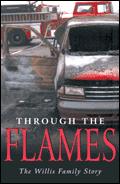 Sixteen years ago on November 8, 1994, Scott and Janet Willis were traveling outside Milwaukee, Wisconsin with the six youngest of their nine children. Scott was a pastor at the Parkwood Baptist Church in the Mt. Greenwood neighborhood on Chicago’s Far Southwest Side and Janet schooled the six younger children at their home on the second story of the church. In an instant their lives were forever changed as a piece of metal debris on the road punctured their gas tank and their minivan erupted in flames. The couple barely escaped with their lives as the inferno blazed throughout the van, instantly killing five of the children still buckled in their seats (Joe, Sam, Hank, Elizabeth, and Peter, ages 11 years to 6 weeks). Thirteen year old, Ben escaped the burning van but later died at the hospital with third degree burns over 90% of his body.
Sixteen years ago on November 8, 1994, Scott and Janet Willis were traveling outside Milwaukee, Wisconsin with the six youngest of their nine children. Scott was a pastor at the Parkwood Baptist Church in the Mt. Greenwood neighborhood on Chicago’s Far Southwest Side and Janet schooled the six younger children at their home on the second story of the church. In an instant their lives were forever changed as a piece of metal debris on the road punctured their gas tank and their minivan erupted in flames. The couple barely escaped with their lives as the inferno blazed throughout the van, instantly killing five of the children still buckled in their seats (Joe, Sam, Hank, Elizabeth, and Peter, ages 11 years to 6 weeks). Thirteen year old, Ben escaped the burning van but later died at the hospital with third degree burns over 90% of his body.
This horrific tragedy would throw this Chicago pastor and his family into the international spotlight and eventually lead to the imprisonment of former Illinois Governor George Ryan. The deaths of the Willis children came to symbolize the infamous licenses-for-bribes political scandal during Ryan’s tenure as Secretary of State before his election as Governor in 1999.
A year after the accident, the Willis’ bravely spoke before the Wheaton College chapel on November 17, 1995, to share their personal story of tragedy and testimony of faith. In subsequent years, they moved to Tennessee in 2004 and have been blessed with 25 grandchildren from their surviving three older children.
.
A Wray of Hope
When Wayne Wray initially enrolled at Wheaton College, his desire as a student was to pursue veterinary medicine and oceanography, reflecting his passion for the outdoors. He wrote on his application: “I can offer Wheaton a life dedicated to Christ and believe your acceptance of me will give me advantages I will not find in all colleges. My hope is in Christ and I commit all things to His leadership.” As a sophomore in the fall of 1972, his goal as an athlete was to be the defensive starting end for the Crusaders. Through grueling practice and determination he earned the position. During his first starting game as a varsity football player, playing against Millikan University, he received a critical injury, a fractured and dislocated fourth cervical. Suddenly he was paralyzed from the neck down. He endured three major surgeries in three days. Each time the neurosurgeons declared, “No hope.” 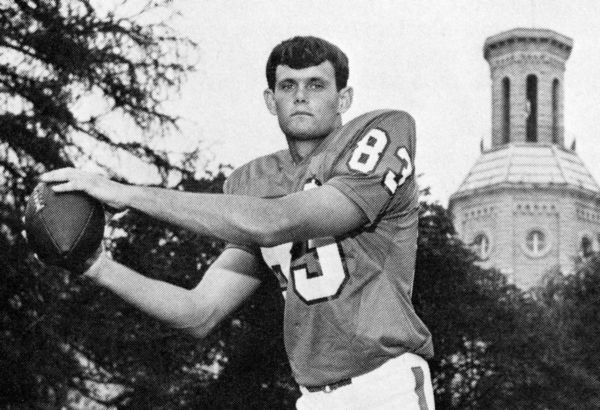 As he lay motionless in the intensive care unit, drifting in and out of consciousness, Wayne prayed and sought God’s will for his life, now so dramatically altered. Strengthened by his faith and the constant encouragement of friends and family, Wayne did not surrender to despondency. Instead, he set objectives and accomplished them one by one, tackling his rehabilitation with the same focus with which he’d played ball. He learned to type, write and print. “He cheers and lifts you up when you go to see him,” visitors remarked. “He’s not bitter, he would play again if his body were healed.” Wayne decided that he would encourage others as a profession.
As he lay motionless in the intensive care unit, drifting in and out of consciousness, Wayne prayed and sought God’s will for his life, now so dramatically altered. Strengthened by his faith and the constant encouragement of friends and family, Wayne did not surrender to despondency. Instead, he set objectives and accomplished them one by one, tackling his rehabilitation with the same focus with which he’d played ball. He learned to type, write and print. “He cheers and lifts you up when you go to see him,” visitors remarked. “He’s not bitter, he would play again if his body were healed.” Wayne decided that he would encourage others as a profession.
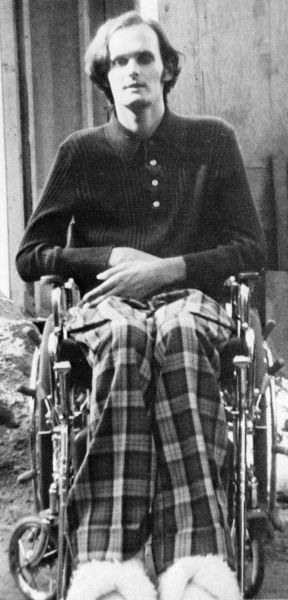 To assist with medical expenses, classmates raised $100,000 for the “Wray of Hope” campaign. In 1972 Wayne returned to Wheaton College to receive an honorary degree. Following that he earned his associate’s degree from Springfield Technical Community College and his bachelor’s degree from Northern Colorado University. Fulfilling his desire to help others who’d experienced similar injuries, he received his master’s degree in rehabilitation counseling in 1982. That year he also married Jeanette Gaffney, a physical therapist. The wedding was performed by his Wheaton roommate, Scott McClellen. Though Wayne provided a shining beacon for victims of spinal injuries, he faced one more challenge in 1986 when he was diagnosed with cancer. After battling illness for several months, he died at age 34 on January 4, 1987, at his home in Ocala, Florida. As he’d indicated on his college application, he did truly “commit all things to His leadership.” Wayne’s football coach at Wheaton College, Gary Taylor, observed at the funeral, “He taught us about courage because he faced unbelievable odds and time and again beat them…He set goals, saying, ‘If I can only get by today, then I can start on tomorrow.'”
To assist with medical expenses, classmates raised $100,000 for the “Wray of Hope” campaign. In 1972 Wayne returned to Wheaton College to receive an honorary degree. Following that he earned his associate’s degree from Springfield Technical Community College and his bachelor’s degree from Northern Colorado University. Fulfilling his desire to help others who’d experienced similar injuries, he received his master’s degree in rehabilitation counseling in 1982. That year he also married Jeanette Gaffney, a physical therapist. The wedding was performed by his Wheaton roommate, Scott McClellen. Though Wayne provided a shining beacon for victims of spinal injuries, he faced one more challenge in 1986 when he was diagnosed with cancer. After battling illness for several months, he died at age 34 on January 4, 1987, at his home in Ocala, Florida. As he’d indicated on his college application, he did truly “commit all things to His leadership.” Wayne’s football coach at Wheaton College, Gary Taylor, observed at the funeral, “He taught us about courage because he faced unbelievable odds and time and again beat them…He set goals, saying, ‘If I can only get by today, then I can start on tomorrow.'”
A memorial scholarship in Wayne’s honor was established at Wheaton College to recognize, encourage and financially assist any upperclass student who has faced, or is facing, personal adversity, and who nevertheless shows continued growth in faith, in academic performance and in contribution to campus life.
Give me the harp I hear…
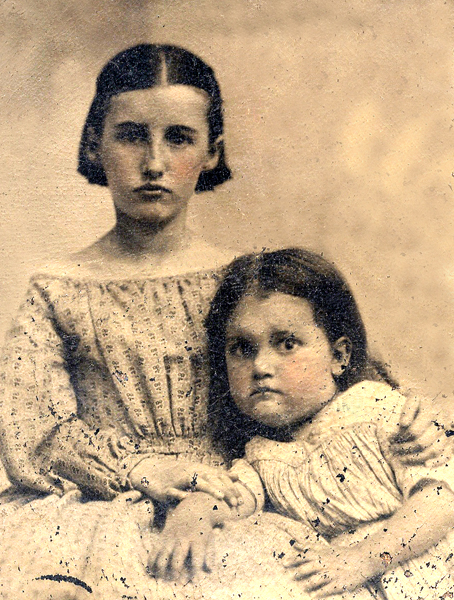 Shortly after the death of seven-month old Jonathan Edwards Blanchard in Cincinnati another child was conceived by Jonathan and Mary Blanchard. Born on January 7, 1841, Mary Avery Blanchard entered life on her mother’s birthday and was so named for her. The eldest of the Blanchard children, Jonathan and Mary sought to provide the best educational opportunities for Mary Avery. For a summer she lived with the John Payson Willistons and enrolled in school in Northampton, Massachusetts. While in school Jonathan wrote his daughter encouraging her to not worry about her grade level but whether she was thorough in her work. When she wrote back in one letter about the handsome men Jonathan wrote back and said she was there to study. Displaying his beliefs about the education of women Jonathan had Mary Avery studying Greek, so that she may read the New Testament, Latin and Mathematics. He told her that “Latin was a glorious language of a glorious people….Love it.” When Mary Avery returned to Galesburg she finished her studies at Knox Female Seminary and became a school teacher in Prospect City, Illinois for a time. When she was seventeen she enrolled at Mount Holyoke College. Jonathan expected much of his eldest child. She had the same impetuous spirit as her father. Engaged for a time to a Mr. Caldwell, someone that Jonathan believed to be less than pious, Mary Avery snapped back that she would marry him and they would go to hell together. However, before they could wed Mary Avery contracted consumption, known today as tuberculosis. Though she was able to make the move to Wheaton with the family when Jonathan assumed the presidency of Wheaton College, Mary Avery died on December 6, 1860, a month before her twentieth birthday. This was the fourth child that Jonathan and Mary Blanchard had lost before reaching full adulthood. Enamored with the work of John G. Fee, Mary Avery bequeathed what little worldly goods she had to his work at Berea College in Kentucky.
Shortly after the death of seven-month old Jonathan Edwards Blanchard in Cincinnati another child was conceived by Jonathan and Mary Blanchard. Born on January 7, 1841, Mary Avery Blanchard entered life on her mother’s birthday and was so named for her. The eldest of the Blanchard children, Jonathan and Mary sought to provide the best educational opportunities for Mary Avery. For a summer she lived with the John Payson Willistons and enrolled in school in Northampton, Massachusetts. While in school Jonathan wrote his daughter encouraging her to not worry about her grade level but whether she was thorough in her work. When she wrote back in one letter about the handsome men Jonathan wrote back and said she was there to study. Displaying his beliefs about the education of women Jonathan had Mary Avery studying Greek, so that she may read the New Testament, Latin and Mathematics. He told her that “Latin was a glorious language of a glorious people….Love it.” When Mary Avery returned to Galesburg she finished her studies at Knox Female Seminary and became a school teacher in Prospect City, Illinois for a time. When she was seventeen she enrolled at Mount Holyoke College. Jonathan expected much of his eldest child. She had the same impetuous spirit as her father. Engaged for a time to a Mr. Caldwell, someone that Jonathan believed to be less than pious, Mary Avery snapped back that she would marry him and they would go to hell together. However, before they could wed Mary Avery contracted consumption, known today as tuberculosis. Though she was able to make the move to Wheaton with the family when Jonathan assumed the presidency of Wheaton College, Mary Avery died on December 6, 1860, a month before her twentieth birthday. This was the fourth child that Jonathan and Mary Blanchard had lost before reaching full adulthood. Enamored with the work of John G. Fee, Mary Avery bequeathed what little worldly goods she had to his work at Berea College in Kentucky.
Upon Mary Avery’s death M. F. Bigney, editor of the the New Orleans paper, The Daily City Item, wrote
Give Me The Harp. She was known as a pious girl and these words were based upon her final earthly words, “Give me the harp I hear.” The poem appeared in Bigney’s The Forest Pilgrims, and other poems published in 1867.
Give me the harp with the sounding strings,
The harp whose tones I hear–
It seems upborne by an angel’s wings,
And unto my bursting heart it brings
The sounds of hope and cheer–
A melody all divine, that springs
From a higher and purer sphere.
Give me the harp, and this trembling hand
Released from the ills of earth,
Shall learn the lays of the better land,
Shall touch the strings with a high command,
And the joy of a spirit-birth
Shall thrill my soul with a rapture grand,
With a fond and holy mirth.
Give me the harp, and I’ll bid farewell
To the fleeting scenes of time ;
With the loved ones gone before I’d dwell,
My harp with theirs should the echoes swell
Of a high immortal rhyme ;
Give me the harp, for I fain would tell
Of release from this world of crime.
Truth Unchanged, Unchanging…
Dr. Iain Murray, biographer of Dr. D.M. Lloyd-Jones, pastor of Westminster Chapel in London, writes of the famed Reformed theologian’s visit to the campus of Wheaton College:
On Monday, August 11, the Lloyd-Joneses left Toronto for Wheaton College (near Chicago) where Carl F.H. Henry had asked ML-J to give the first series of Jonathan Blanchard Lectures on a subject related to apologetics. The result was five addresses subsequently published as Truth Unchanged, Unchanging. In essence they were an explanation of his whole approach to evangelism: the modern secular scene requires no new apologetic because man’s condition in sin is the same as it always has been; only the Bible can explain that condition and only the gospel provides a remedy radical enough for the problem. One relaxation in the heat wave which overtook them at Wheaton was an outing to the farm of some Welsh relatives in Illinois. After writing to his mother with news of the relatives, ML-J had to add something on his special interest: “They certainly have some wonderful ponies. Unfortunately it was too hot for us to see any of them in motion.”
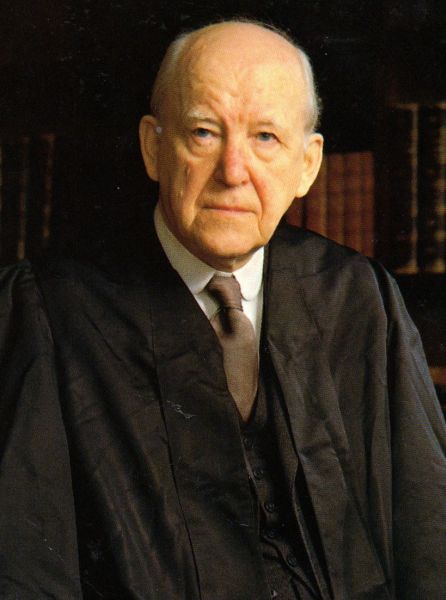
Lloyd-Jones’ five Blanchard lectures, collectively titled “Sin: Its Diagnosis and Treatment,” eventually comprised Truth Unchanged, Unchanging (1951), which was his first post-war book to be printed. The ongoing lecture series, sponsored by the Alumni Association, was intended to be primarily apologetic and academic in emphasis rather than devotional. The conservative Welsh preacher was the successor to G. Campbell Morgan, the “Prince of Expositors,” at Westminster Chapel. Lloyd-Jones died in 1981.
Evan Welsh on the Wheaton College Presidents
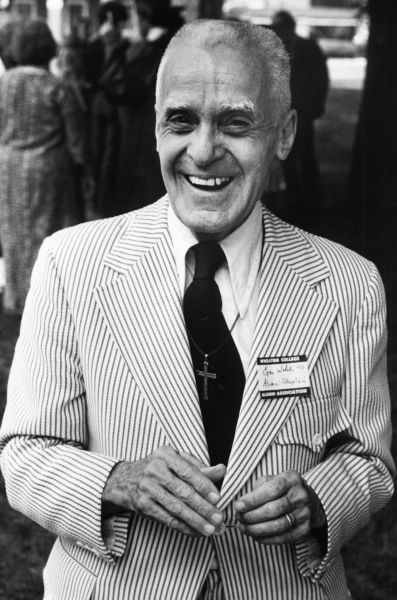 Dr. Evan Welsh, Wheaton’s first chaplain, serving from 1955-70, and later as Alumni Chaplain, sat for this excerpted 1980 interview, conducted by Mark Dawson, for the Record. The 75-year-old preacher briefly recounts the Wheaton College presidents he has known.
Dr. Evan Welsh, Wheaton’s first chaplain, serving from 1955-70, and later as Alumni Chaplain, sat for this excerpted 1980 interview, conducted by Mark Dawson, for the Record. The 75-year-old preacher briefly recounts the Wheaton College presidents he has known.
“He was one of the most striking-looking men that ever lived,” Welsh recalled of Charles Blanchard. “He was about six-two, well built, had snowy white hair, a snowy mustache, and piercing black eyes. But he was very gentle, very loving, very firm, very courageous. He treated the college like his family. He had deep convictions on salvation, holy living and the Law of God.” Welsh said that late in his career, Blanchard insisted that Wheaton maintain its doctrinal integrity in the face of rising modernism in the evangelical world. Even so, in the 1920s evangelicalism began to shift away from the ideals of the Blanchards. “Churches became prophetic centers,” Welsh said. “I remember in chapel in 1925, an outstanding speaker telling us that it looked like 1926 was surely the day of the Lord’s coming. They were so preoccupied with eschatology that they neglected the social aspect of the gospel that had been big in (Jonathan) Blanchard’s day.”
With the sudden death of Charles Blanchard in 1925, the college invited J. Oliver Buswell to take the presidency. Describing Buswell as “an excellent scholar, a strong speaker and a great theologian,” he added that Buswell was committed to being separated from the old-line denominations. Welsh praised Buswell for getting Wheaton accredited in spite of hostility from secular educators because of the college’s evangelical stance. He also complimented Buswell for his doctrinal convictions, his emphasis on good scholarship, and for doubling the student population. According to Welsh, Buswell introduced the pledge to assure the Christians of his day that Wheaton would not “go down the drain” once the Blanchards were gone. “We had no pledge in my day,” he said. “Although President Blanchard believed strongly in the separated life.” Welsh spoke highly of Buswell, but said his differences with the trustees of his support of an independent missions board and of a controversial football coach led him to resign.
“Dr. Edman was just the man to take the presidency at that time,” Welsh continued. “In the midst of the fundamentalist-modernist controversy, here comes Ray Edman, a very pacifistic soul, a fine, devout Christian. He was a marvelous P.R. man. In any group he just won their hearts. I think how many times he’d say, ‘Evan, your caffeine count is low, let’s go out for a cup of coffee.’ He was a very genial, warm person, a keen mind, a good administrative hand at the helm, and a fervent spirit.”
Likewise, Welsh described Dr. Armerding as a spiritual giant. “I have seen him grow on the job,” he said. “He was less of a mixer with students than Dr. Edman when he took the presidency, but that has changed over the years.” Citing an example, Welsh described a chapel service in the 1960s. “He gave the chapel talk, and then he said, ‘Now before I close this chapel, there’s another part to it that’s going to come as a complete surprise even to the other party involved. Will Jerry Lower please come forward?’ This surprised hippie-type person – I can hardly tell this without tears – came forward. Then Dr. Armerding just threw his arms around him. Well, the chapel went wild.” Welsh paused, drying his eyes with his hands. “Do you think I’ve communicated my feeling about Wheaton, guy?” Welsh said his love for Wheaton centers around its biblical basis, its strong scholarship, and its social passion. “I sometimes say to my wife, we’ve been privileged to know some of the best people in the world.”
Low Degrees and Frost
Wheaton College has issued several honorary degrees throughout the years. Seldom, perhaps, has it offered the tempting potentiality of receiving one, as in the case of Henry W. Frost, Home Director for North America of the China Inland Mission (now called Overseas Missionary Fellowship), founded by Hudson Taylor. 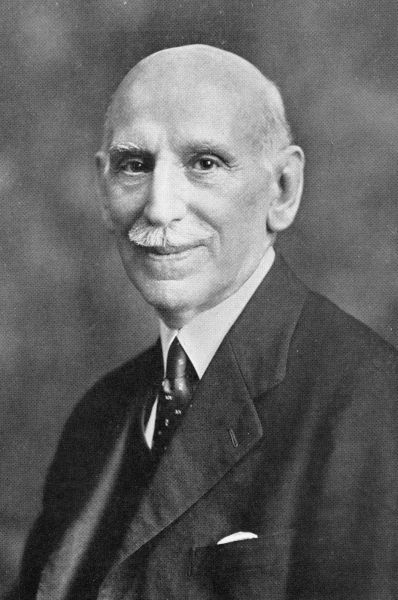 In the following exchange, Frost gently prods a somewhat distracted Dr. Charles A. Blanchard, second president of Wheaton College, toward remembering a past communication.
In the following exchange, Frost gently prods a somewhat distracted Dr. Charles A. Blanchard, second president of Wheaton College, toward remembering a past communication.
May 12, 1921
Dear Dr. Blanchard,
You will recall the fact that I was corresponding with you about a year ago about the possibility of my receiving from the college a B.A. degree. I have hoped to hear from you in regard to the matter but have not done so. Thinking you may have written and that your letter has gone astray, I beg to enquire whether or not the faculty reached any conclusion in the matter. I am sorry to trouble you about what concerns myself, rather than the interests of the college, but I shall be grateful for a few lines giving your decision. May I add, if you can grant me the degree, that it will have real value in the Lord’s service, especially now that I am living in Princeton, where such an honor is held in much esteem. It has been a pleasure to get better acquainted with you of late…
With warm regards, I am, yours faithfully,
Henry W. Frost
Though this is a somewhat pressing matter for Frost’s late-life phase of ministry, Blanchard seems to have relegated it to a lower priority:
May 18, 1921
My dear brother,
In this busy life, with so many things crowding upon me, I am sorry to say I forgot many things I wish I could remember. I had entirely lost sight of the matter about which you wrote me. I am afraid you sent me some information about your educational history which I have mislaid and forgotten. Supposing you tell me again. I know of your relations to the China Inland Mission and I approve of them thoroughly. I need, however, in stating the case to my fellow workers, to know all the facts that I may answer the questions which they are certain to ask.
With best regards, and wishing you every blessing, I am faithfully yours,
Charles A. Blanchard
Frost patiently reiterates his predicament:
May 23, 1921
Dear Dr. Blanchard,
Your most kind letter of the 18th was duly received upon the 21st. I beg to thank you for it and for the generous sympathy which it expresses. In answer to your question about our past correspondence, allow me to reply as follows: About a year ago I asked you if I could pursue with you an extra muros course of study which would lead to my securing a B.A. degree. 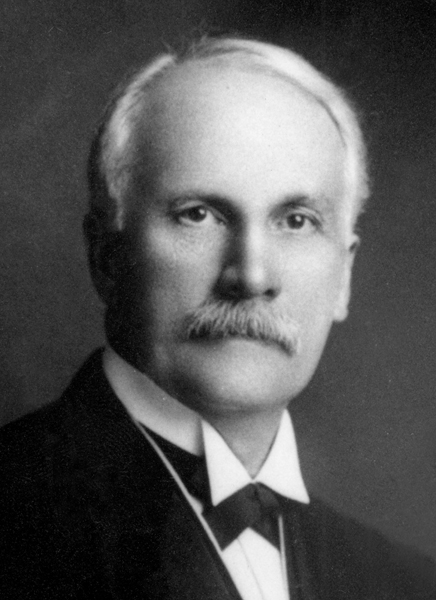 You answered that Wheaton had no such arrangement, but you said, if I would give you the facts of the case, that the faculty might grant me an honorary degree. I then explained that I had been a student at Princeton, in the class of ’80; that I had taken and passed my examinations for the first two years; that I had continued in spite of poor health, through the third year, taking some examinations but not all; and that sickness had prevented my continuing through the fourth year; that I had could not make up what was lacking in Princeton in view of the fact that a regular attendance of classes was required and my busy life forbade my attempting this; and finally, that I desired a degree for two reasons, first, that I might be more in touch with University men, and second and particularly, that being more closely connected with them I might be the more used of the Lord in their behalf. Following this, you asked for the names of two individuals to whom you might write concerning me and whose letters you might present to the faculty. I then gave you the names of the Rev. Charles R. Erdman, D.D., professor in the seminary here and Rev. T.R. O’Meara, D.D., Principal of Wycliffe College, Toronto. As Dr. O’Meara recently asked me if I had heard from you, I know that you wrote to him and that he replied, and I presume the same is true in respect to Dr. Erdman. I should have refrained from writing again to you about so personal and apparently selfish a matter had it not been for the fact that settling at Princeton, where college degrees are so much valued, has emphasized my need of being in rapport with those about me. I am anxious to be used of God here as largely as possible and I am assured that having a degree will much increase my usefulness. Thanking you for anything you may do in my behalf and assuring you of my warm regards,
You answered that Wheaton had no such arrangement, but you said, if I would give you the facts of the case, that the faculty might grant me an honorary degree. I then explained that I had been a student at Princeton, in the class of ’80; that I had taken and passed my examinations for the first two years; that I had continued in spite of poor health, through the third year, taking some examinations but not all; and that sickness had prevented my continuing through the fourth year; that I had could not make up what was lacking in Princeton in view of the fact that a regular attendance of classes was required and my busy life forbade my attempting this; and finally, that I desired a degree for two reasons, first, that I might be more in touch with University men, and second and particularly, that being more closely connected with them I might be the more used of the Lord in their behalf. Following this, you asked for the names of two individuals to whom you might write concerning me and whose letters you might present to the faculty. I then gave you the names of the Rev. Charles R. Erdman, D.D., professor in the seminary here and Rev. T.R. O’Meara, D.D., Principal of Wycliffe College, Toronto. As Dr. O’Meara recently asked me if I had heard from you, I know that you wrote to him and that he replied, and I presume the same is true in respect to Dr. Erdman. I should have refrained from writing again to you about so personal and apparently selfish a matter had it not been for the fact that settling at Princeton, where college degrees are so much valued, has emphasized my need of being in rapport with those about me. I am anxious to be used of God here as largely as possible and I am assured that having a degree will much increase my usefulness. Thanking you for anything you may do in my behalf and assuring you of my warm regards,
I am, yours very faithfully,
Henry W. Frost
Blanchard at last dedicates attention to the Frost affair and it appears that resolution is near:
May 26, 1921
My dear brother: I have just returned after an absence of some days and have been in my office very little for quite a while. This must be my partial apology for tardiness in writing. I hope to be at home now for some days and I will try to take up the matter concerning which you have written to me, at once.
With best regards, I am, sincerely yours,
Charles A. Blanchard
The remainder of the exchange is not extant. Evidently, Frost seems to have been denied his request, as he is not cited among Wheaton College’s honorary degree recipients. This responsibility fell to another institution. According to his biography, “By Faith”: Henry W. Frost and the China Inland Mission by Dr. and Mrs. Howard Taylor, he was in 1929 conferred an honorary Doctor of Divinity by Westminster College, representing the United Presbyterian denomination, “…in recognition of his contribution to Christian life and literature…”
Mission Band
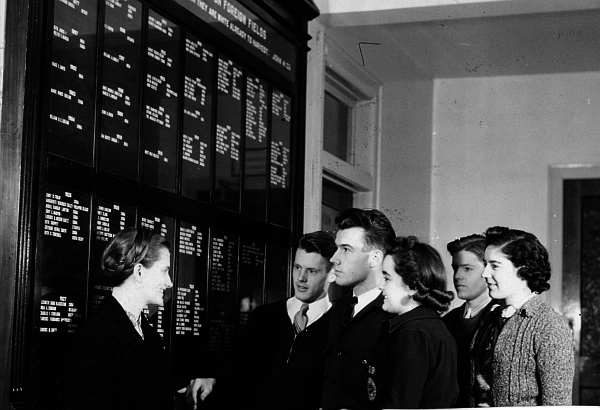 For many decades a listing of Wheaton graduates in missionary service has been posted in Blanchard Hall to serve as a reminder to students to pray–pray for the missionaries and what part they might play in the Lord’s work. For years that listing was in a center hall on the first floor and after the full renovation of Blanchard, completed in 1990, the listing has been posted on the second floor. This listing, by decades, shows generation after generation of students who have sought to go out into the world serving others. Jonathan Blanchard viewed Wheaton as a central starting point in a global vision. When asked why Wheaton he said, “Because Wheaton is near Chicago, the gate city between the Atlantic and the Pacific, between Western Europe and Eastern Asia….But the chief reason was, I believed the Lord had need of Wheaton College, to aid the way for His coming.”
For many decades a listing of Wheaton graduates in missionary service has been posted in Blanchard Hall to serve as a reminder to students to pray–pray for the missionaries and what part they might play in the Lord’s work. For years that listing was in a center hall on the first floor and after the full renovation of Blanchard, completed in 1990, the listing has been posted on the second floor. This listing, by decades, shows generation after generation of students who have sought to go out into the world serving others. Jonathan Blanchard viewed Wheaton as a central starting point in a global vision. When asked why Wheaton he said, “Because Wheaton is near Chicago, the gate city between the Atlantic and the Pacific, between Western Europe and Eastern Asia….But the chief reason was, I believed the Lord had need of Wheaton College, to aid the way for His coming.”
As noted in his A Perfect State of Society, Jonathan Blanchard believed the the function of the Gospel was to reclaim and restore. One of the ways that students have expressed their desire put Jonathan’s ideas into action has been in the area of foreign missions. 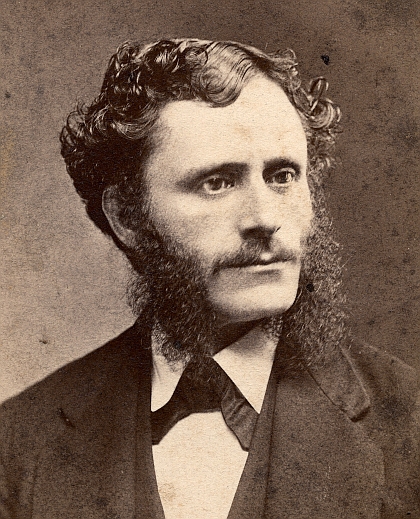 Wheaton’s first missionary graduates were Anastasios Zaraphonithes and Henry Martyn Bissell. For many years missionary activity was an individual interest but near the turn of the twentieth-century groups of students gathered to advance mission work. Just as the Student Volunteer Movement was emerging Wheaton’s Mission Band began in October 1890 as a group of students who wanted to consider ways to “best promote the interest in missions among their fellow students and at the same time be preparing themselves for their future work.” A constitution was signed on December 7, 1890 by nine students pledging, “God willing, to become Foreign Missionaries….” This group met Sunday mornings to study missions, various fields of service, peoples and their customs, needs and religions. Those that attended pledged 5 cents a week to support missionaries and some who were “expecting to work for our Master in the dark corners of His vineyard….” Professor Elsie Dow led the group through George Smith’s History of Christian Missions from Abraham and Paul to Carey, Livingstone and Duff (1884). In 1894 six Wheaton students served as delegates at the International Convention of the Student Volunteer Movement that was held in Detroit, Michigan. Though the Mission Band did not officially join the Student Volunteer Movement until 1904, in 1897 the group changed their name to Student Volunteers for Foreign Missions.
Wheaton’s first missionary graduates were Anastasios Zaraphonithes and Henry Martyn Bissell. For many years missionary activity was an individual interest but near the turn of the twentieth-century groups of students gathered to advance mission work. Just as the Student Volunteer Movement was emerging Wheaton’s Mission Band began in October 1890 as a group of students who wanted to consider ways to “best promote the interest in missions among their fellow students and at the same time be preparing themselves for their future work.” A constitution was signed on December 7, 1890 by nine students pledging, “God willing, to become Foreign Missionaries….” This group met Sunday mornings to study missions, various fields of service, peoples and their customs, needs and religions. Those that attended pledged 5 cents a week to support missionaries and some who were “expecting to work for our Master in the dark corners of His vineyard….” Professor Elsie Dow led the group through George Smith’s History of Christian Missions from Abraham and Paul to Carey, Livingstone and Duff (1884). In 1894 six Wheaton students served as delegates at the International Convention of the Student Volunteer Movement that was held in Detroit, Michigan. Though the Mission Band did not officially join the Student Volunteer Movement until 1904, in 1897 the group changed their name to Student Volunteers for Foreign Missions.
Living the Creative Life
 The Omaha Gospel Tabernacle was founded in 1921 by Dr. R.R. Brown of the Christian and Missionary Alliance. Two years later Brown started Radio Chapel Service, broadcasting the first nondenominational services, and during the early 1930s it attracted a weekly national audience of more than 500,000. The broadcast continued for the next 53 years, achieving the distinction as the longest continuous radio program. In 1938 Brown was a keynote speaker for the Christian and Missionary Alliance, which had previously convened for 13 consecutive years on the campus of Wheaton College. On Sunday he typically preached at the Tabernacle, the Bible Church and College Church. His sermon, “Living the Creative Life,” is taken from Not By Bread Alone (1940), a collection of Wheaton College chapel addresses (all delivered in Pierce Memorial Chapel, seen above) edited by Carl F. H. Henry:
The Omaha Gospel Tabernacle was founded in 1921 by Dr. R.R. Brown of the Christian and Missionary Alliance. Two years later Brown started Radio Chapel Service, broadcasting the first nondenominational services, and during the early 1930s it attracted a weekly national audience of more than 500,000. The broadcast continued for the next 53 years, achieving the distinction as the longest continuous radio program. In 1938 Brown was a keynote speaker for the Christian and Missionary Alliance, which had previously convened for 13 consecutive years on the campus of Wheaton College. On Sunday he typically preached at the Tabernacle, the Bible Church and College Church. His sermon, “Living the Creative Life,” is taken from Not By Bread Alone (1940), a collection of Wheaton College chapel addresses (all delivered in Pierce Memorial Chapel, seen above) edited by Carl F. H. Henry:
In considering matter of creative living, let us turn to the Second Book of Kings, the second chapter. There we have the words of Elijah to Elisha, What shall I give to you? And the response is, “I Would that a double portion of Thy Spirit be upon me.” There is in these words a gripping concern over the course of living that Elisha should pursue. Every man lives either creatively or corruptly. The highest, the most noble ambition in the world today is to live creatively; not to inspire a man to be the best ball player in the world, the best student, the best musician or the finest artist, but to install a personal and vital relationship to the one great Redeemer and the gospel purpose. The world knows no higher and no more noble ambition than that motivating an individual who lives so that he will persuade men and women to come to know God as He is in Jesus Christ, the foundation of all character and all security in a mans life. I saw a young man get up the other night before a church audience. He had a fine message, but he gave the audience the idea that he thought he was a fine preacher. The young people commented, “Wonderful oratory!” You are not going out to preach, but you are going out to tell someone something. If you are dedicating your life to missionary service for Christ, the highest ambition is to make men and women come to know God as He is revealed in Christ, to know Him not only as a Savior, but also in all the fulness and revelation of His power. The Bible is the unfolding of the person and work of Jesus Christ, and as I increase in the knowledge of the Book, I increase in the knowledge of Jesus. The youth of this generation need to be told how to be more than a success. Before we can effectively present Christ, the foundation of character and security, we need to learn how to make men and women know God. It is not sufficient merely to give information about Christ; we need also that creative impulse that make us not only articulate Him but also lead others creatively to the knowledge of Him. There are many in our day who have a superficial method of expressing their spirituality. People get the idea that when one becomes spiritual, he must assume a superficial attitude. There was none of this in Elisha. Elisha followed Elijah, who said, “Ask what I shall do for thee, before I be taken away from thee.” And Elisha said, “I pray thee, let a double portion of thy spirit be upon me.” Elijah’s mantle fell; Elisha picked it up, remembering the words, If thou see me when I am taken from thee, it shall be so unto thee, but if not, it shall not be so. When the mantle fell and Elijah disappeared, Elisha turned right around to express his faith. He struck the waters of the Jordan and crossed over. He had to go to the other side of Jordan. The place of creativeness is the other side of Jordan, the other side of Calvary. Surrender your life to His fullness. Jesus is our Elijah. He went through to the other side of Calvary. He told them to tarry, to wait, for He would drop His mantle. The Holy Spirit came. You can walk, live, think, and act in the power of that Spirit.
Heiko Oberman at Wheaton – Lutherfest
As Reformation Sunday approaches it is good to recall the work of God in the life of Martin Luther. In 1983, Wheaton College celebrated the quinquicentennial of the birth of Martin Luther with a semester of festivities. 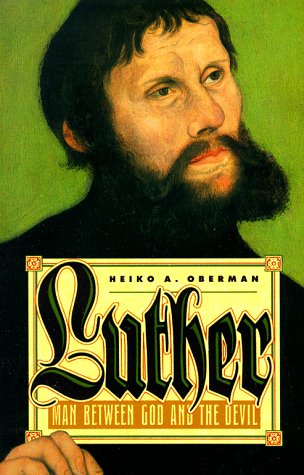 Dubbed Lutherfest, it included an Lutheran worship service in Edman Chapel with local Lutherans as well as an organ recital featuring Professor Warren Schmidt of Wartburg College. The pinnacle of the Lutherfest was an academic conference from September 19-21 that featured international scholars speaking on topics relating to Luther and Lutheranism.
Dubbed Lutherfest, it included an Lutheran worship service in Edman Chapel with local Lutherans as well as an organ recital featuring Professor Warren Schmidt of Wartburg College. The pinnacle of the Lutherfest was an academic conference from September 19-21 that featured international scholars speaking on topics relating to Luther and Lutheranism.
The centerpiece of the conference was the renowned Reformation historian Heiko A. Oberman (1930-2001), who gave three plenary addresses during the conference. One of the greatest intellectual historians of the twentieth century, Oberman revolutionized Reformation studies by urging for interpretation of the Reformation especially in its late medieval context. In 1982, he published what has become a classic of Luther studies: Luther: Mensch zwischen Gott und Teufel, published in English in 1989 as Luther: man between God and the devil.
To commemorate Reformation Day, we’ve provided MP3 audio for all three of Oberman’s plenary talks.
![]() (The Formation of Martin Luther – mp3 – 01:04:47)
(The Formation of Martin Luther – mp3 – 01:04:47)
.
![]() (Luther in the Reformation – mp3 – 00:59:12)
(Luther in the Reformation – mp3 – 00:59:12)
.